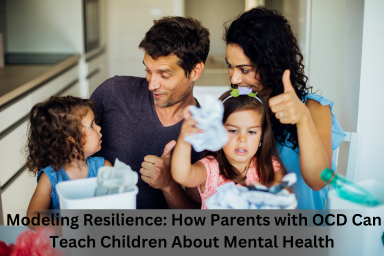
December 8, 2024
- admin
- Leave a Commenton Modeling Resilience: How Parents with OCD Can Teach Children About Mental Health
Parenting is a journey filled with joys, challenges, and countless opportunities for growth. When a parent also grapples with Obsessive-Compulsive Disorder (OCD), the path may seem more daunting, but it also presents a unique chance to impart invaluable lessons about resilience, empathy, and the significance of mental health. In this blog, we’ll explore how parents with OCD can navigate this delicate balance, fostering a supportive environment that not only benefits their own well-being but also lays the foundation for their children’s understanding of mental health.
1. Opening the Conversation: Age-Appropriate Communication
The first step in teaching children about mental health is initiating open and age-appropriate conversations. Parents can explain, in simple terms, what OCD is and how it may manifest in their behaviors. Emphasizing that mental health is a spectrum, just like physical health, helps children understand that everyone faces challenges, and it’s okay to seek help.
2. Fostering Empathy and Understanding
Parents with OCD have an opportunity to instill empathy in their children by helping them understand that everyone experiences struggles. By sharing personal experiences in a relatable manner, parents can humanize the condition and demonstrate that mental health challenges do not define a person. Encouraging questions and providing honest, age-appropriate answers fosters an environment of understanding and compassion.
3. Seeking Professional Help as a Positive Step
Demonstrating resilience includes acknowledging when additional support is needed. Parents can emphasize that seeking help from mental health professionals is a positive and proactive step towards well-being. Involving children in discussions about therapy or counseling helps demystify the process and reinforces the idea that mental health care is a normal and beneficial part of life.
4. Creating a Supportive Family Environment
A supportive family environment is crucial for both the parent with OCD and their children. Establishing routines, clear communication channels, and a safe space for expressing emotions fosters a sense of security. Children, in turn, learn that open communication and mutual support are essential components of maintaining good mental health for the entire family.
5. Embracing Imperfections and Celebrating Successes
Parents can model resilience by embracing imperfections and celebrating successes, both big and small. This includes acknowledging when challenges arise, discussing coping strategies, and highlighting personal achievements. By doing so, parents teach children that setbacks are a natural part of life, and overcoming them builds strength and resilience.
6. Educational Resources and Age-Appropriate Tools
Providing age-appropriate resources about mental health can further aid in children’s understanding. Books, videos, or online materials designed for different age groups can supplement conversations, offering insights into various mental health conditions and reducing stigma. This proactive approach equips children with the knowledge and vocabulary to navigate discussions about mental health with peers and educators.
7. Encouraging Emotional Intelligence
Parents with OCD can encourage the development of emotional intelligence in their children by validating and discussing emotions openly. Teaching coping mechanisms and problem-solving skills helps children navigate their emotions in a healthy way. This not only benefits their immediate family dynamic but equips them with crucial life skills for the future.
Conclusion
Parenting with OCD presents its challenges, but it also provides a unique opportunity to model resilience, foster empathy, and instill a healthy understanding of mental health in children. By initiating open conversations, seeking professional help when needed, and creating a supportive family environment, parents can empower their children to approach mental health with compassion and resilience. Together, parents and children can contribute to breaking down the stigma surrounding mental health and building a foundation for a more compassionate and understanding society.



